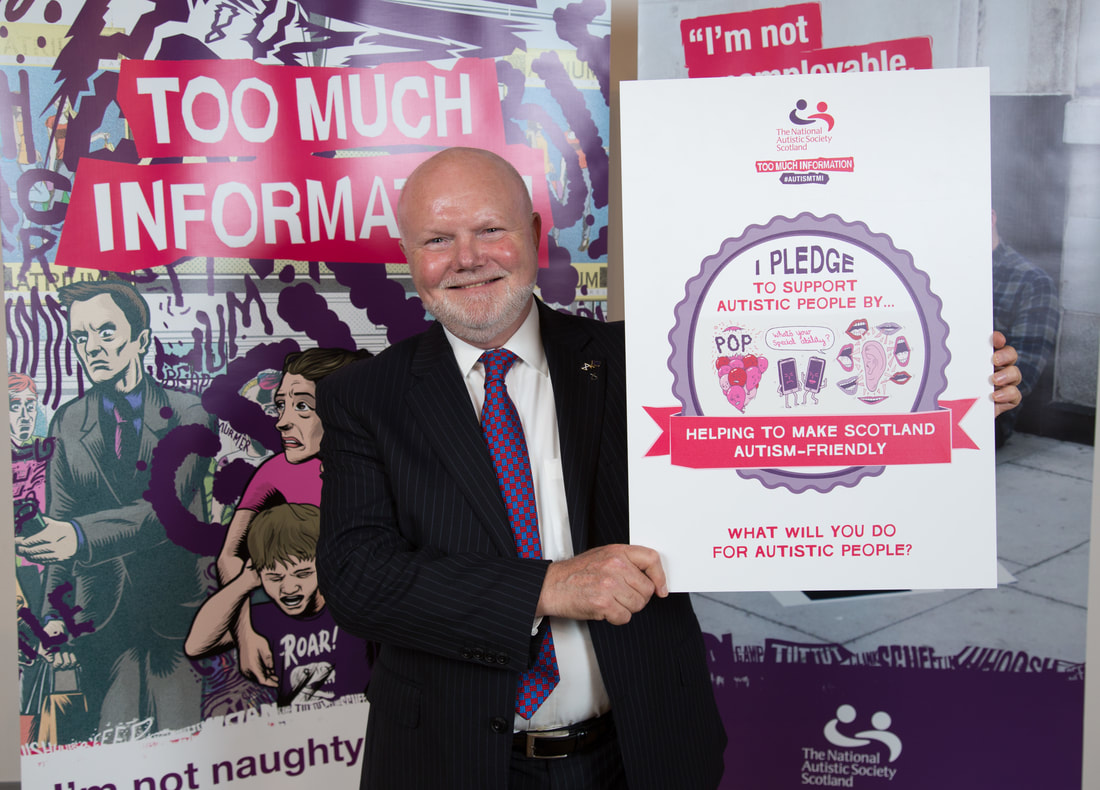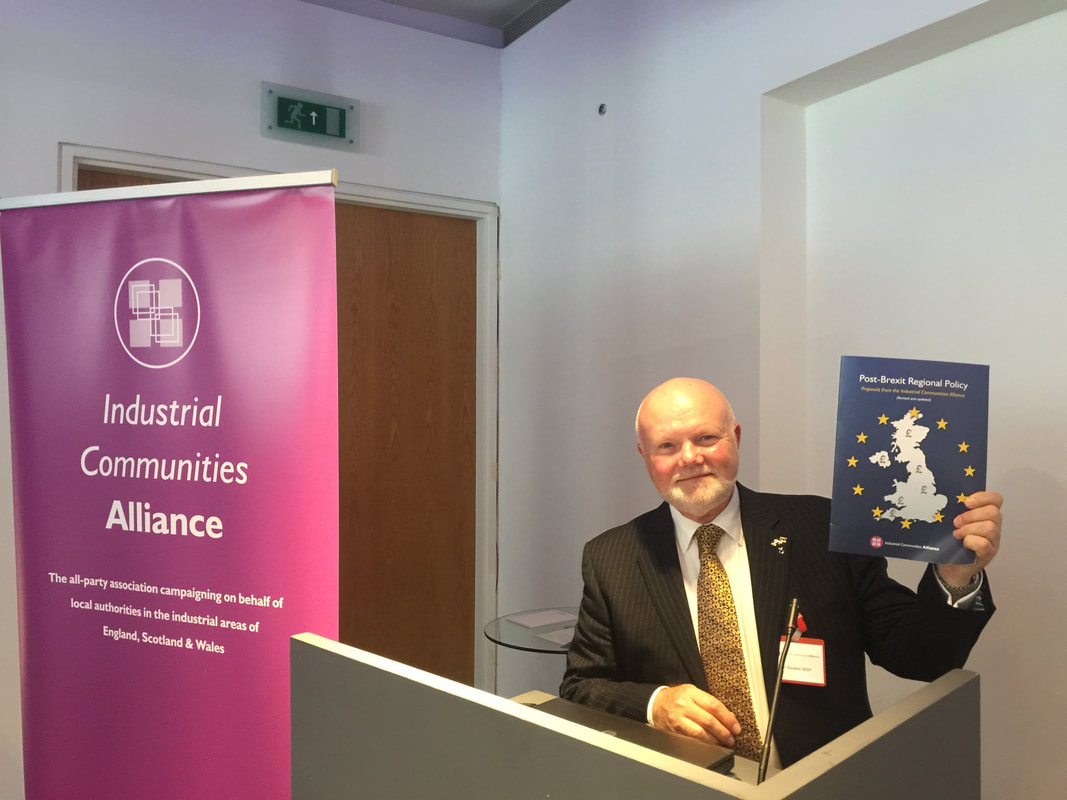|
Colin Beattie, MSP for Midlothian North and Musselburgh, has pledged to support his autistic constituents and make Scotland an autism-friendly nation.
He made the pledge at an event held at Holyrood by The National Autistic Society Scotland. As part of its Too Much Information campaign, the charity is asking people across Scotland to learn about autism and the small changes they can make to their behaviour to be more autism-friendly. Speaking at the event, Colin Beattie MSP said: “I have pledged to help my autistic constituents by helping to make Scotland autism-friendly. “I am pleased to support The National Autistic Society Scotland’s campaign and I hope that people across Midlothian and East Lothian will take time to learn about autism, a condition which affects around one in 100 people.” Research has revealed that 66 per cent of autistic people feel socially isolated, and 44 per cent sometimes don’t go out because they are worried about how others will react to their autism. Jenny Paterson, director of The National Autistic Society Scotland, said: “Autistic people and their families have told us that increased understanding is the single biggest thing that would improve their lives. That’s why we’re asking people to take time to learn about the small changes they can make to their behaviour that make a big difference – such as avoiding jargon and showing patience when others seem stressed or anxious. “I am grateful to Colin for joining us at Scottish Parliament to show his commitment to making our nation autism-friendly.” Around 58,000 people in Scotland are autistic. Together with their families they make up around 232,000 people whose lives are touched by autism every single day. To find out more about The National Autistic Society Scotland’s Too Much Information campaign, please visit www.autism.org.uk/get-involved/tmi.aspx
0 Comments
Today Colin Beattie, MSP for Midlothian North and Musselburgh, welcomed the publication of proposals for a post-industrial Brexit policy. The publication is the work of the Industrial Communities Alliance (ICA), the local authority association campaigning on behalf of councils in the industrial areas of England, Scotland and Wales.
The policy outlines a range of steps to ensure post-industrial areas do not lose out from a lack of EU funding post-Brexit. In particular the policy refers to the creation of a UK Shared Prosperity Fund, intended to be around £1.5 billion a year, to replace EU funding. Mr Beattie spoke at a launch event in Glasgow, acknowledging the publication and outlining how it could align with Scottish politics. Mr Beattie remarked: 'I firmly welcome this publication. These proposals are a strong step in the right direction to ensuring post-industrial communities in East Lothian/Midlothian continue to receive the funding they need once we leave the EU. 'Research indicates that Scotland has an allocation of around £787 million in EU funding over 2014 to 2020. Some of this funding has gone towards initiatives such as the Tyne-Esk LEADER group, who support rural projects throughout East Lothian and Midlothian. 'The Horizon 2020 programme, which funds research and innovation projects, received around 2.7 million Euros between 2014 and 2016 for use in East Lothian and Midlothian. 'Initiatives such as these will drastically lose out if we don't take steps to mitigate the loss of EU funds. Clearly, the creation of a UK Shared Prosperity Fund will help ensure stability in the future. 'I have been closely involved with the Industrial Communities Alliance in my role as the convener, and I congratulate them on this forward-thinking document. 'I was pleased to have the opportunity to provide a Scottish perspective. I look forward to seeing this taken on board as we progress.' END The Post-Brexit Regional Policy can be found at http://www.industrialcommunitiesalliance.org/uploads/2/6/2/0/2620193/post-brexit_regional_policy__updated_.pdf Today, SNP MSP Colin Beattie announced his support for a mandatory registration system for commercial dog walkers. This follows recent reports that Midlothian councillors had debated such a system at a recent cabinet meeting.
Mr Beattie, MSP for Midlothian North and Musselburgh, said: ‘From the discussions I’ve had with constituents, it’s clear that a registration system would be highly valued. ‘At present dog owners have no guarantee of quality with commercial dog walkers, and if something goes wrong during a walk it can be very difficult to pin down culpability. ‘Using a mandatory system would allow for trust and responsibility on all sides. Dog owners would be reassured that their dog is in safe hands, while we would have the opportunity to weed out ‘rogue’ commercial dog walkers. ‘I hope the Council will take this issue further and I look forward to seeing progress being made.’ Today Colin Beattie, MSP for Midlothian North and Musselburgh, welcomed confirmation from East Lothian Council that it does not own any high rise domestic stock at which cladding, such as that in use at Grenfell Tower in London, could be in use.
Mr Beattie wrote to East Lothian Council following last week’s disastrous fire in London, which so far has seen 79 people dead or missing presumed dead and many more unaccounted for. East Lothian Council confirmed that it does not own any high rise domestic stock (defined as those which have a floor higher than 18m above ground level). Further, the Council confirmed that, of the Registered Social Landlords who responded to the Council’s enquiries, one identified a high rise domestic block in Dunbar which has not received any rainscreen cladding treatment. The Council noted, while its Building Standards Division does not hold a record of all private sector properties, from knowledge within the team no applications have ever been received for any high rise domestic properties meeting the criteria over the last 25 years. Mr Beattie said: ‘The fire at Grenfell Tower is one of the worst crises to occur in modern history. The true scale of needless deaths will probably never be known. ‘My thoughts are naturally with loved ones and friends and relatives of anyone affected by the fire, and I’m sure everyone throughout East Lothian and all across Scotland feels the same way. ‘If nothing else, the people of East Lothian can now be reassured that the disaster in London is very unlikely to happen here. I appreciate the swift response from the Council to my letter, and we can only hope that the Council’s high standards are being met by other public bodies across Scotland and the UK.’ END Today Colin Beattie, MSP for Midlothian North and Musselburgh, welcomed the news from Midlothian Council that it does not use the cladding that was in place at London’s Grenfell Tower.
Mr Beattie wrote to Midlothian Council following last week’s disastrous fire in London, which so far has seen 79 people dead or missing presumed dead and many more unaccounted for. Midlothian Council confirmed that, aside from Midlothian not having any tower blocks or high rise domestic properties, the cladding used in Grenfell Tower is not a product the Council currently uses in any of its housing projects. The Council also confirmed that the external wall insulation to its low rise domestic properties has been using a wet dash finish over an insulation board which has differing fire resistance qualities to that used in Grenfell Tower. Finally, the Council stated that all of the insulation programme has been subjected to independent Building Standard approval. Mr Beattie said: ‘The fire at Grenfell Tower is one of the worst crises to occur in modern history. The true scale of needless deaths will probably never be known. ‘My thoughts are naturally with loved ones and friends and relatives of anyone affected by the fire, and I’m sure everyone throughout Midlothian and all across Scotland feels the same way. ‘If nothing else, the people of Midlothian can now be reassured that the disaster in London is very unlikely to happen here. I appreciate the swift response from the Council to my letter, and we can only hope that the Council’s high standards are being met by other public bodies across Scotland and the UK.’ |
Parliamentary WorkArchives
May 2024
Links |






